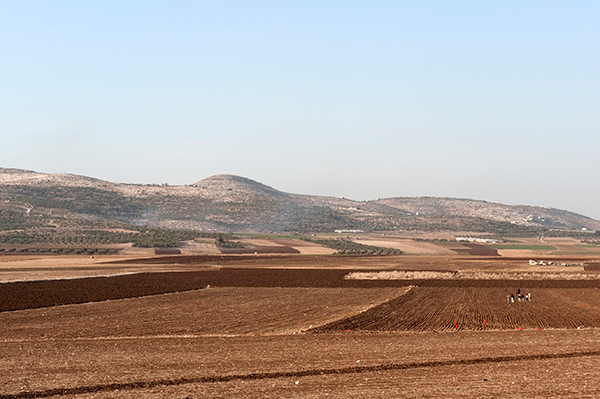We met Dr. Tawfiq Bdeiri, Deputy Assistant for Planning and Engineering Affairs at the Ministry of Local Government, in his office in Ramallah, shortly prior to taking this issue of This Week in Palestine to print. As per the title, we wanted a first-hand account on the Ministry of Local Government’s engagement in Area C. With a doctorate in Regional and Urban Planning from Cairo University and hands-on experience after years at the Ministry, Bdeiri was the right person to talk to.
The Ministry of Local Government is quite conscious of Area C’s potential impact on the economy of a future Palestinian State, Bdeiri says. He refers to the World Bank’s July 2014 report that estimates a hike of as much as thirty-five percent to the Palestinian GDP, an extra US$ 2.4 billion, if businesses and farms were permitted to develop in Area C. With that drive, the ministry is doing its best to implement its mandate to help local communities in planning infrastructure issues and helping prepare local outline plans (master plans) with the clear goal of local economic development. Following a national strategy of giving priority to Area C, adopted in 2011, the Ministry of Local Government followed suit to ensure steadfastness on the ground.
Engagement with the local communities is best witnessed in the preparing of the outline plans. The participatory approach adopted was met with extraordinary local enthusiasm. Successful workshops were set up where, in some cases, illiterate people participated in the drawing of the map of their village or local community. The Ministry of Local Government’s engagement with the people, along with its advocacy that empowers local residents, has created a relationship that is based on trust and good faith. Another success, Bdeiri adds, is the local understanding and the willingness to implement the concept of public good.
 The challenges are great, Dr. Tawfiq Bdeiri concludes. With the abolishment of local and district planning committees in 1971, as stipulated by the (supposedly) implemented Jordanian Planning Law of the year 1966, and with a Higher Planning Council currently represented solely by Israeli army personnel, very few local outline plans and infrastructure projects intended for Palestinian communities in Area C had been approved since the 1970’s. In 2011, the ministry started encouraging the Palestinian communities in Area C to prepare alternative local outline plans to meet their needs and aspirations. Only three out of the seventy-seven local outline plans submitted to the Israeli Civil Administration received approval. However, in a new practice adopted by the ministry, if eighteen months have passed and no reply from the Israeli Civil Administration has been received, the Ministry of Local Government starts implementation without explicit Israeli approval. In some cases, Bdeiri says, Israel did not object. Finally, Dr. Bdeiri’s expressed his wish for the donor community to be bolder in extending aid to develop local communities in Area C even without the Israeli authorities’ approval.
The challenges are great, Dr. Tawfiq Bdeiri concludes. With the abolishment of local and district planning committees in 1971, as stipulated by the (supposedly) implemented Jordanian Planning Law of the year 1966, and with a Higher Planning Council currently represented solely by Israeli army personnel, very few local outline plans and infrastructure projects intended for Palestinian communities in Area C had been approved since the 1970’s. In 2011, the ministry started encouraging the Palestinian communities in Area C to prepare alternative local outline plans to meet their needs and aspirations. Only three out of the seventy-seven local outline plans submitted to the Israeli Civil Administration received approval. However, in a new practice adopted by the ministry, if eighteen months have passed and no reply from the Israeli Civil Administration has been received, the Ministry of Local Government starts implementation without explicit Israeli approval. In some cases, Bdeiri says, Israel did not object. Finally, Dr. Bdeiri’s expressed his wish for the donor community to be bolder in extending aid to develop local communities in Area C even without the Israeli authorities’ approval.
Article photos from Palestine
Image Bank.




